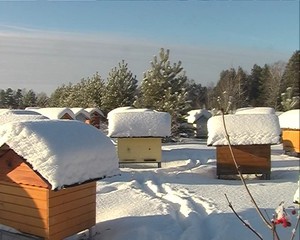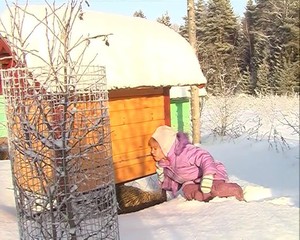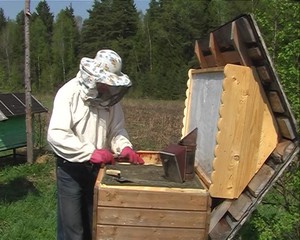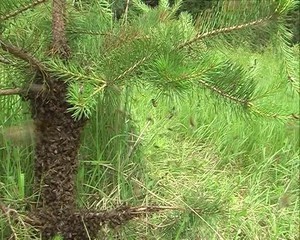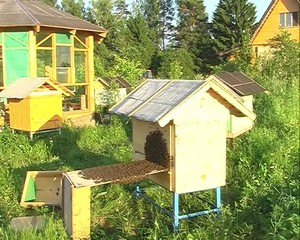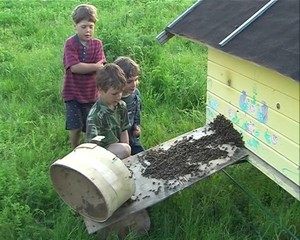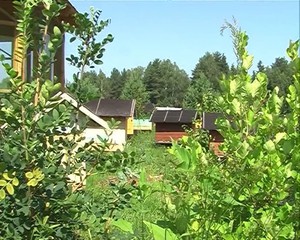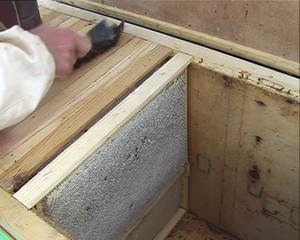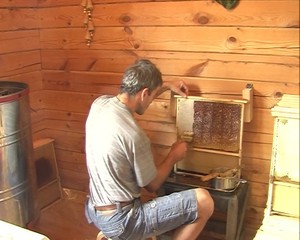Fyodor Lazutin's book and film "Keeping Bees with a Smile"
About Fyodor Lazutin
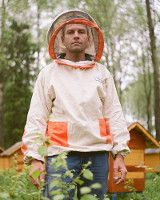 Fyodor Leonidovich Lazutin was born in a small city located in the Murmansk region, not too far from the Arctic Circle. His parents have never kept bees, and his own passion took some time to develop. After graduating from the Moscow Institute of Physics and Technology (majoring in molecular biology), he spent several years doing scientific work at the Gamalei Institute of Epidemiology and Microbiology. In addition, he mastered many other professions and worked for years as a carpenter and cabinet-maker, even running his own woodworking shop.
Fyodor Leonidovich Lazutin was born in a small city located in the Murmansk region, not too far from the Arctic Circle. His parents have never kept bees, and his own passion took some time to develop. After graduating from the Moscow Institute of Physics and Technology (majoring in molecular biology), he spent several years doing scientific work at the Gamalei Institute of Epidemiology and Microbiology. In addition, he mastered many other professions and worked for years as a carpenter and cabinet-maker, even running his own woodworking shop.
His interest in honeybees and beekeeping came later, after Fyodor moved to Maloyaroslavetz. It very quickly became his main activity. Later, he moved to the Mosalsky region and founded a project called Medvinka. Why this name? It turns out that, before the Russian Revolution, there was a village with the same name. In 1901, about 500 people lived there, and on the same spot where there is now a beekeepers club, there used to be a school. Before the war, the village consisted of 50 houses. During the war, there were battles that left craters and trenches which can be still seen today. But only memories were left of the school and houses.
The main goal of the Medvinka project is the restoration of the Middle Russian bee (a local honeybee race). Unlike many imported southern species of bees, this race overwinters well and brings in more honey.
Fyodor Leonidovich was not alone in pursuing these goals. He and several like-minded people reached an agreement with the local government to seriously and permanently settle here and create many more apiaries in the future. They bought a land share, rented another 240 hectares of land for many years, and started to grow some of the most common honey plants such as phacelia, blueweed, sweet clover and mustard.
Fyodor was the president of GEN-Russia (the Russian branch of the Global Ecovillage Network) and one of the founders of the "Kovcheg" ("Ark") ecovillage. He has lived here with his family more than 10 years, and had a large apiary. The total population of "Kovcheg" is about 100 people, including 40 children. As the website states, settlers choose this ecological way of living because they do not see any future for themselves or their children in modern urban civilization.
Fyodor has died on February 16, 2015 in the Moscow Institute of Neurosurgery after being in a coma for two weeks, preceded by brain tumor surgery. There are several condolence letters collected on gen-russia.ru.
References: vest-news.ru and pomorcpp.org
"Keeping Bees with a Smile"
"Keeping Bees with a Smile: A Vision and Practice of Natural Apiculture" Fyodor Lazutin, Dr. Mark Pettus, Dr. Leonid Sharashkin, 2013
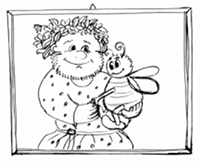 This little book is not another textbook about beekeeping. Moreover, it is not a textbook at all and does not pretend to represent anything new in the science of bees. Its author just felt the urge to share his own experiences and thoughts, which pushed him to change his approach to beekeeping.
This little book is not another textbook about beekeeping. Moreover, it is not a textbook at all and does not pretend to represent anything new in the science of bees. Its author just felt the urge to share his own experiences and thoughts, which pushed him to change his approach to beekeeping.
The book talks about the natural process of beekeeping, when the intervention into bees' lives is reduced to a minimum. It is about the effects of not feeding them with sugar, minimizing hive manipulation by not using honey supers, stopping the treating of bees with chemicals and abandoning artificial breeding. A bee family lives all year on collected nectar and honey, and builds its own winter reserves. Surplus honey is collected in late autumn, when it is ripe and there is no brood. In short, this approach provides bees with the maximum possible freedom to run their own lives.
Original (Russian) book
The original Russian version of the book is available online for free:
- Parts 1 and 2 - Keeping bees with a smile (pdf)
- Part 3 - Details of the natural approach to beekeeping
- Part 4 - On wintering bees
- Questions and answers about the natural approach to beekeeping
It can also be purchased in printed form on rznbooks.ru and ozon.ru.
English translation
The English translation is available only in printed form, for example on the publisher's website Deep Snow Press and on Amazon.
Book description
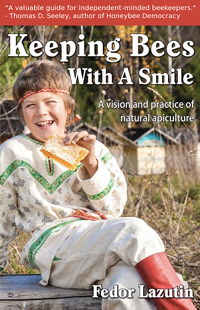 You can keep bees, naturally!
You can keep bees, naturally!
“Keeping Bees with a Smile is a valuable guide for independent-minded beekeepers who are seeking ways to keep bees without treating them with chemicals, disrupting their homes, and otherwise intruding on their lives. Fedor Lazutin, one of Russia's foremost natural beekeepers, describes a beekeeping system based on a trust of a bee colony as a living being capable of solving life's challenges without human assistance. Beginner-friendly and complete with fascinating photographs, it is a special book, and one that I expect will 'shake up' the thinking of the independent-minded beekeepers in North America and Europe.” - Thomas D. Seeley, Cornell University, author of "Honeybee Democracy".
Are you just curious about bees, or a practicing beekeeper looking for natural alternatives that work? If yes, this book is for you! Lazutin's approach is fun, healthy, rewarding, and accessible to all.
Discover his unique insights on how to:
- Keep bees naturally without interfering in their lives;
- Start an apiary for free by attracting local bee swarms;
- Build maintenance-free hives that mimic how bees live in nature;
- Keep colonies healthy and strong without any drugs or gimmickry;
- Help bees successfully overwinter even in the harshest climate;
- Enhance local nectar plant resources;
- Produce truly natural honey without robbing the bees; and
- Reverse the global bee decline... right in your backyard!
An invaluable resource for beginners and professionals alike, this richly illustrated book is complete with plans for making bee-friendly, well-insulated horizontal hives with extra-deep frames - plus other fascinating advice you won't find anywhere else. You will gain a profound respect for the bees' intelligence, the practical information for successfully starting and maintaining a few (or many!) colonies in your own backyard, and an appreciation of the bees' harmonious cooperative ways - which may be the key to creating a brighter future for our planet.
Reviews of the English version of the book
Discussion thread on beesource.com.
“Keeping Bees with a Smile really offers an in-depth understanding of the workings of the bee colony, and shows a truly natural way of beekeeping that is also hands-off and fun. The book is thorough (402 pages!), sumptuously illustrated, beginner-friendly yet covers so many subjects that are hard to find in other sources. The author's approach is so approachable and gentle on the bees that I feel it will take natural beekeeping to new heights. And it's not just my opinion - the book has received high acclaim from such luminaries as Dr. Thomas D. Seeley of Cornell University (author of "Honeybee Democracy" and "The Wisdom of the Hive").” - Leonid Sharashkin
“For anybody who really cares about the bees more than profit; this book makes sense. Morally, with the unprecedented and overwhelming challenges facing us all -- I am excited and hopeful for this approach.” - Peggy Bell
“This is the most common sense approach to beekeeping I have ever read! The book provides much detail about how honeybees would live naturally without human intervention and the hives are designed around that concept. If you are a current beekeeper or are interested in becoming one I would highly recommend reading this book!” - 4BigDogs
“One of the best books on raising Bees that I have read. Very professional yet very easy to read, could not put it down.” - Thomas E Perry
The film «Keeping Bees with a Smile»
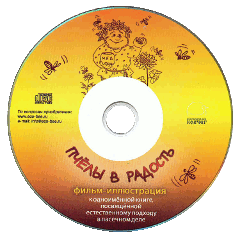
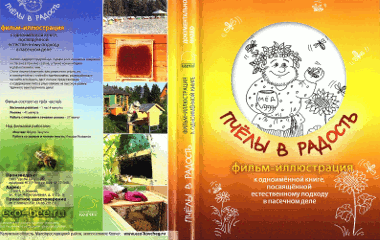 The film "Keeping Bees with a Smile" focuses on practical aspects of beekeeping in horizontal hives with extra-deep frames or, in broader terms, on the natural approach to beekeeping described in a book of the same name followed by a series of articles.
The film "Keeping Bees with a Smile" focuses on practical aspects of beekeeping in horizontal hives with extra-deep frames or, in broader terms, on the natural approach to beekeeping described in a book of the same name followed by a series of articles.
Upon reading the book, many people feel like visiting a real apiary to see how to work with bees and maybe to practice doing it. The author would be glad to provide this opportunity to everyone; however, this is impossible. The major and most interesting procedure - spring inspection - is performed only once a year and takes a day or two; its date is not defined and depends on weather and the beekeeper's mood. That is, he wakes up in the morning, looks at the sky, and understands - it’s time. How can he invite any visitors? Swarming is also unpredictable. Sometimes, there are no swarms during some days; other times, especially after a period of bad weather, there are three or four swarms simultaneously.
Nonetheless, practice is an indispensable thing, because keeping bees requires that you not only understand well what and why should be done, but also be able to glue frames, start a smoker, catch swarms, and so on. This is like car driving: watching a driver steering is one thing, holding a steering wheel yourself is another. Once these practical skills are acquired, you can enjoy driving.
The purpose of the film is to show how everything is performed in practice. Throughout the entire season, from the early spring up to the late autumn, we have been filming all apiary activities – spring inspection, swarm handling, bees relocation from a bee package to a hive, honey extraction. As a result, we got about thirty hours of the raw material, edited it down to two and a half hours, then added texts and music. As for now, we can assert that the book "Keeping Bees with a Smile" itself, practical articles posted on the website http://eco-bee.ru, and this film have enough material to start keeping bees.
Along with that, the film will be interesting not only to beekeepers-to-be. The bee family life, swarm exit, field bees' busy fuss around a bee-entrance in full swing of flowering honey plants – these are interesting sides of life that we are usually unaware of, but we all depend upon them...
The film consists of 3 parts:
1. Spring audit (1 hr. 04 min.)
2. Swarming (41 min.)
3. Working with the bees during the season (57 min.)
You can buy the film on DVD here (in Russian): http://eco-bee.ru/buy
Lazutin’s Hive (extra-deep 25 frame horizontal hive)
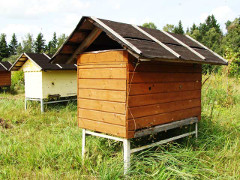 Fyodor has developed his own design of a stationary, 25 extra-deep frame horizontal hive. The hive was designed to:
Fyodor has developed his own design of a stationary, 25 extra-deep frame horizontal hive. The hive was designed to:
- Abandon any manipulations with cases and supers, because it is completely unnatural for bees;
- Increase the height of the frames for bees to spend the winter on;
- Enable bees to build their winter nest on their own, during the summertime;
- Allow the beekeeper to disturb his bees as little as possible
Hive drawings (in Russian) are avalable at http://eco-kovcheg.ru/shop2-1.html. English description can be found at http://www.horizontalhive.com/how-to-build/hive-plywood-beekeeping.shtml. Also you can read about another hive variant at http://www.dheaf.plus.com/framebeekeeping/oneboxhive.htm.
